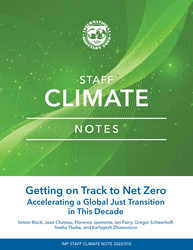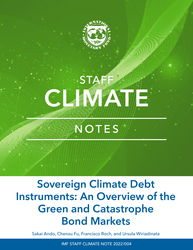
Policies to Foster Green FDI: Best Practices for Emerging Market and Developing Economies
FDI plays a key role in emerging market and developing economies’ ability to finance green projects. Combining econometric evidence and case studies, this SCN explores how climate policies, domestic and international, can help attract FDI in green projects.
READ MORE...
Volume/Issue:
Volume 2024
Issue 004
Publication date: October 2024
ISBN: 9798400289927
$5.00
Add to Cart by clicking price of the language and format you'd like to purchase
Available Languages and Formats
| English |
Prices in red indicate formats that are not yet available but are forthcoming.
Topics covered in this book
This title contains information about the following subjects.
Click on a subject if you would like to see other titles with the same subjects.
Exports and Imports , Environmental Economics , Public Policy- Environmental Policy , Renewable energy , Climate finance , Foreign direct investment , Climate policy , Global , Low carbon technologies , FDI , Climate Policies , Renewable Energy , Green Hydrogen , Electric Vehicles
Also of interest
Summary
Meeting COP28 goals requires a substantial increase in clean energy investment by 2030, including in emerging market and developing economies (EMDEs). Amid domestic financial constraints, foreign direct investment (FDI) could play a key role in EMDEs’ ability to close their renewable energy investment gap and finance green projects, more broadly. This Note finds that strengthening climate policies boosts FDI into renewable energy in EMDEs, especially in those with solar power potential, while less clear effects are found for FDI into EVs and green hydrogen possibly due to their recent emergence. Closing the average climate policy gap with respect to AEs could secure 40 percent of the private finance needed for renewable energy investment in EMDEs, helping overcome the impact of high financing costs. Strengthening the macro-structural framework, such as through improving trade and capital account openness and institutional quality, would also raise green FDI inflows, complementing climate policies. Case studies show that countries that attracted FDI into renewable energy put in place a large and diverse set of policies in the electricity sector, including those that secure a revenue stream for investors in the initial phases, such as power-purchase agreements/feed-in tariffs, renewables targets, and complementary investments. Countries that successfully attracted FDI into EVs relied on the development of national sectoral strategies including production and adoption subsidies, prior comparative advantage in the sector, and bilateral alliances with key players in the EV market. Finally, comprehensive national hydrogen strategies that leverage international efforts to boost production, and good conditions for production of renewable energy, were key drivers of green hydrogen FDI. Global initiatives such as the Just Energy Transition Partnerships and the EU strategy for green hydrogen are benefitting FDI to EMDEs.
Copyright © 2010 - 2026
Powered by:
AIDC



